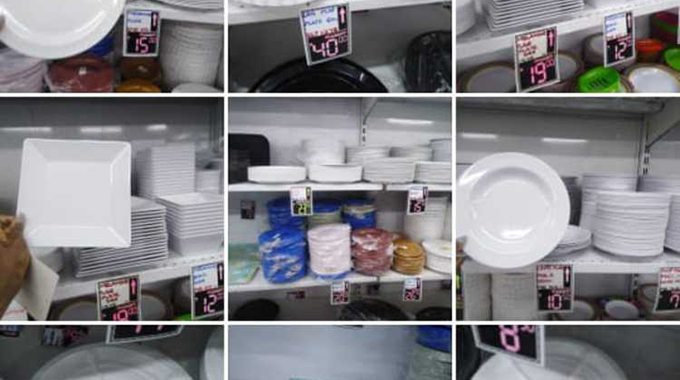Shopping craze beats border closures

Phyllis Kachere Deputy News Editor
Think of the billions of dollars that global online shopping platforms like Alibaba and Amazon have made since the world shut down due to the coronavirus pandemic from around March to date!
With virtually all the countries shutting down their borders to human traffic soon after WHO declared the coronavirus outbreak a global pandemic, online shopping platforms have become the new normal as citizens seek a safer way of procuring goods.
While nations shut their borders to human traffic, commercial cargo has been allowed across trading partners thereby providing a global lifeline to the smooth flow of trade.
Local informal small traders who had thrived on cross border trade with popular destinations of choice like South Africa, Tanzania, Botswana, China, Turkey and Zambia were threatened with total annihilation by the closure of borders as they depended on regular physical movement to move their goods.
Suddenly, hundreds of thousands of families that survived on the mostly regional cross border trade faced uncertainty as border shutdowns threatened their source of livelihood.
Quick thinking and business ingenuity has seen local cross border traders opening a whole new source of livelihood for themselves which has also created opportunities for other informal smaller service providers like money transfer agencies and transport operators who otherwise would have to compete with established ones. The new cross border shopping craze with a whole new vocabulary and a way of conducting business has taken over and is now sustaining families who at one time faced hunger and poverty.
“Our small cross border trade businesses were almost wiped out by the onset of the coronavirus pandemic. Thank God, our ingenuity has helped us create a whole new way of doing business. Through the use of our business networks in countries where we source our wares, we have started a new way of trading. We source for business orders locally and then contact our foreign based contacts whom we call runners in either South Africa, Botswana, Turkey, Tanzania or Zambia, depending on what the clients want, shop for the items and ship them via cross border haulage trucks or small truck drivers,” explained Ngonidzashe who is a lawyer and runs a small cross border clothing retail business.
She explained that traders use social media platforms like WhatsApp to create groups of potential clients through which orders are then made. Goods that are on demand include car parts, groceries, furniture, kitchen utensils and clothing.
“I created a WhatsApp group I named Gloria’s Closet with contacts from my mobile phone. I have business contacts in South Africa, Botswana, China and Turkey through whom I place my clients’ orders. I send them money using a local network of informal money transfer agencies whose rates are affordable for small traders like myself who cannot afford the big corporate money transfer agencies,” said Ngonidzashe.
She explained that she uses WhatsApp groups to advertise new products.
“I use online pictures to advertise my products on various WhatsApp groups. The closure of the borders as ensured that clients now rely on people like myself to buy stuff across borders. I sometimes get overwhelmed by orders and that frustrates me as I fail to mobilise enough money to place orders to meet the demand.”
She explained that the informal money transfer agencies charge as little as 50 rand to transfer amounts that are less than US$100. Anything above US$100 is sent for free.
The catch though is that the money transfer agencies, who are street money changers who have reinvented themselves make a killing from taking only US dollars which are then transferred to South Africa as rands. They make their money through the fluctuating rand against dollar rate. “If I want to send money to my runner in South Africa, I go to my regular money transfer agent who runs bank accounts in South Africa and he simply transfers the amount to my runner’s bank and within seconds, I get my proof of payment and my runner confirms receipt of payment. Obviously my money transfer agent has his own cross border network which he uses. The whole business is run on trust. You cannot afford to cheat in this business. And we work on referrals to build that trust.”
The business is run on trust, she said she sometimes asks her clients to pay a deposit when they place their orders which also helps her to meet the demand. “When clients place their orders, I sometimes ask them to pay a certain amount as deposit. We work on trust and no cheating is permitted in this business. Cheats are ruthlessly dealt with. We protect the integrity of our businesses because that’s our major source of livelihood. Why would I put a source of livelihood of thousands of families in danger by cheating? No, we don’t cheat,” she emphasised. She said their business is an epitome of where customer is king as they aim to please their clients.
“In this business, you cannot afford to quarrel with a customer. Word travels very fast and you don’t want a negative reputation as this may drive away potential customers.”
She explained that because their business strictly operates on trust, dishonesty is ruthlessly dealt with and severe punishment is meted on those found on the wrong side of their ethics. One of the money transfer agents declined an interview, insisting that he doesn’t want to disclose his trade secrets! Another cross border trader who declined identification explained that runners charge fees of between 15-20 percent of the total amount of orders.
“They (runners) also charge a separate amount for transport. When a runner procures the orders we send, she/he then packs the parcels and sends them via small cross border truck drivers. Cross border haulage business has always been dominated by big haulage trucks. Since the border closures, smaller trucks suited for our small orders have taken over business that used to go to cross border buses,” he explained.
He said the friendlier and faster the driver is in delivering orders, the more money he/she makes. “We are a business that operates on trust, friendliness and efficiency, we frown upon those who operate dishonestly. In fact, we severely punish offenders. I will not disclose how we do it, but I can assure you, dishonesty is punished.”
Goods procured within the region usually take four to five days to land while those from China and Turkey sometimes take up to a week if they are sent through runners in South Africa. “It is cheaper to send goods from Turkey through South Africa than to send directly to Zimbabwe. While it would take three days for goods from Turkey to land in Harare, it is also a little more expensive. So, you will find most goods from that country are sent via South Africa and will take at most six days to land.
“Runners also have their networks. If one has an order for goods that are found in say, Turkey, your regular runner usually liaises with their counterpart in that country and the goods are shipped. These days I am getting more orders for goods that are found in Turkey. Costs of procuring from far away countries are a little higher, but that has not stopped the orders from coming in.”
Orders normally arrive on Fridays and popular offloading bays are found at Mbudzi Round About, Machipisa and High Glen Shopping Centre in Harare.
The parcels are fumigated before dispatch.
By the end of the day, the runner, money transfer agent and the cross border trader have made their money while the customer is satisfied as he/she gets his/her goods.







Comments